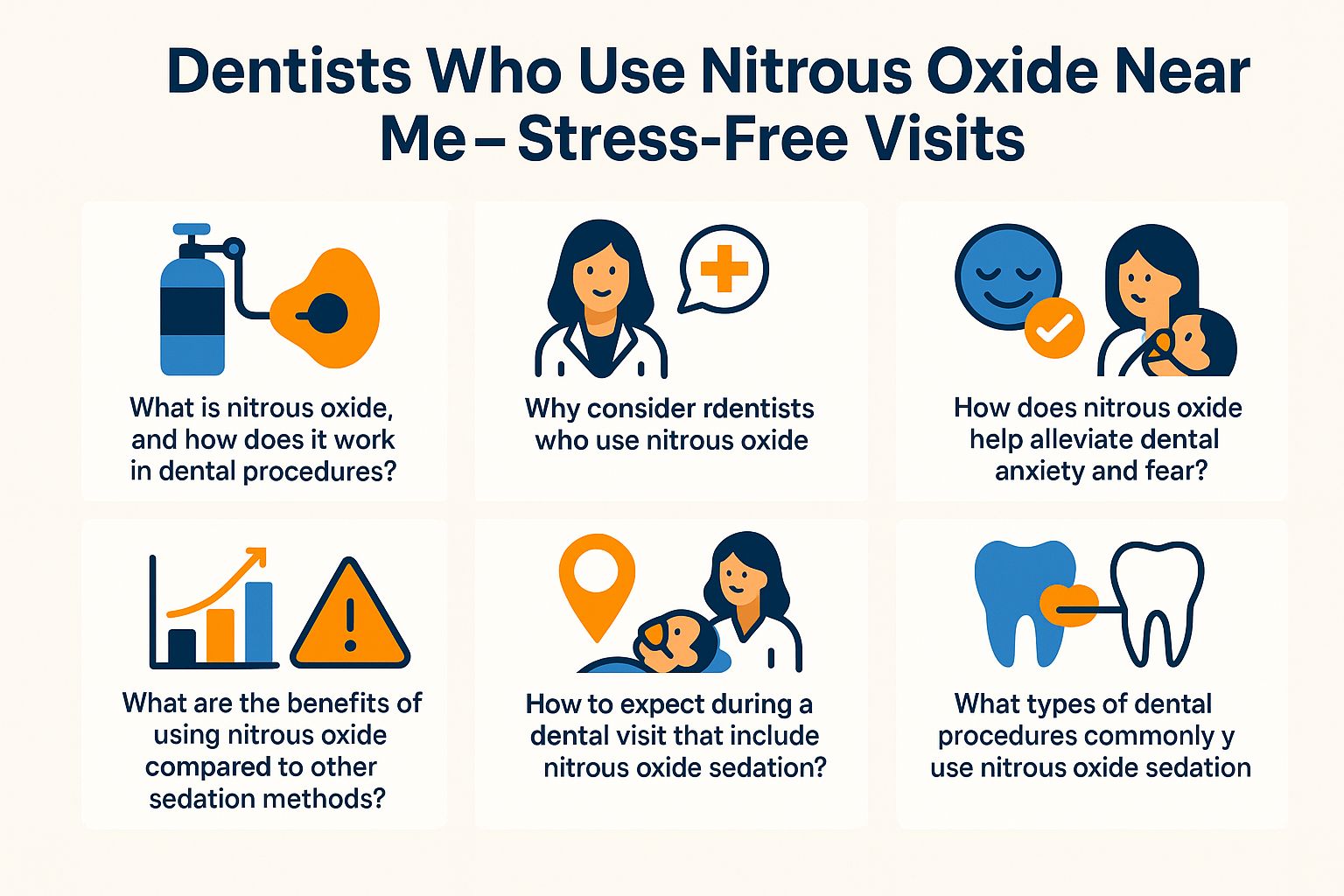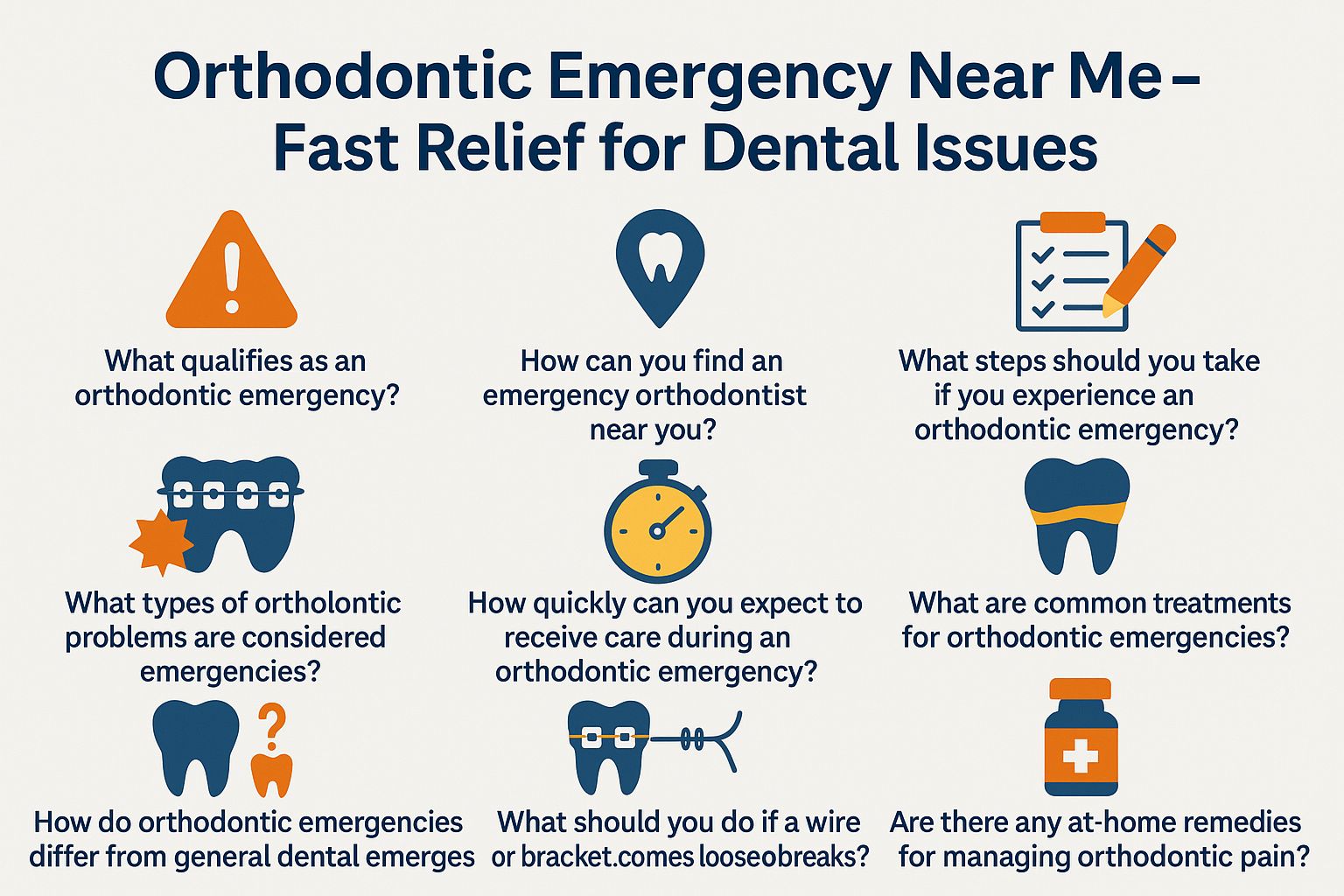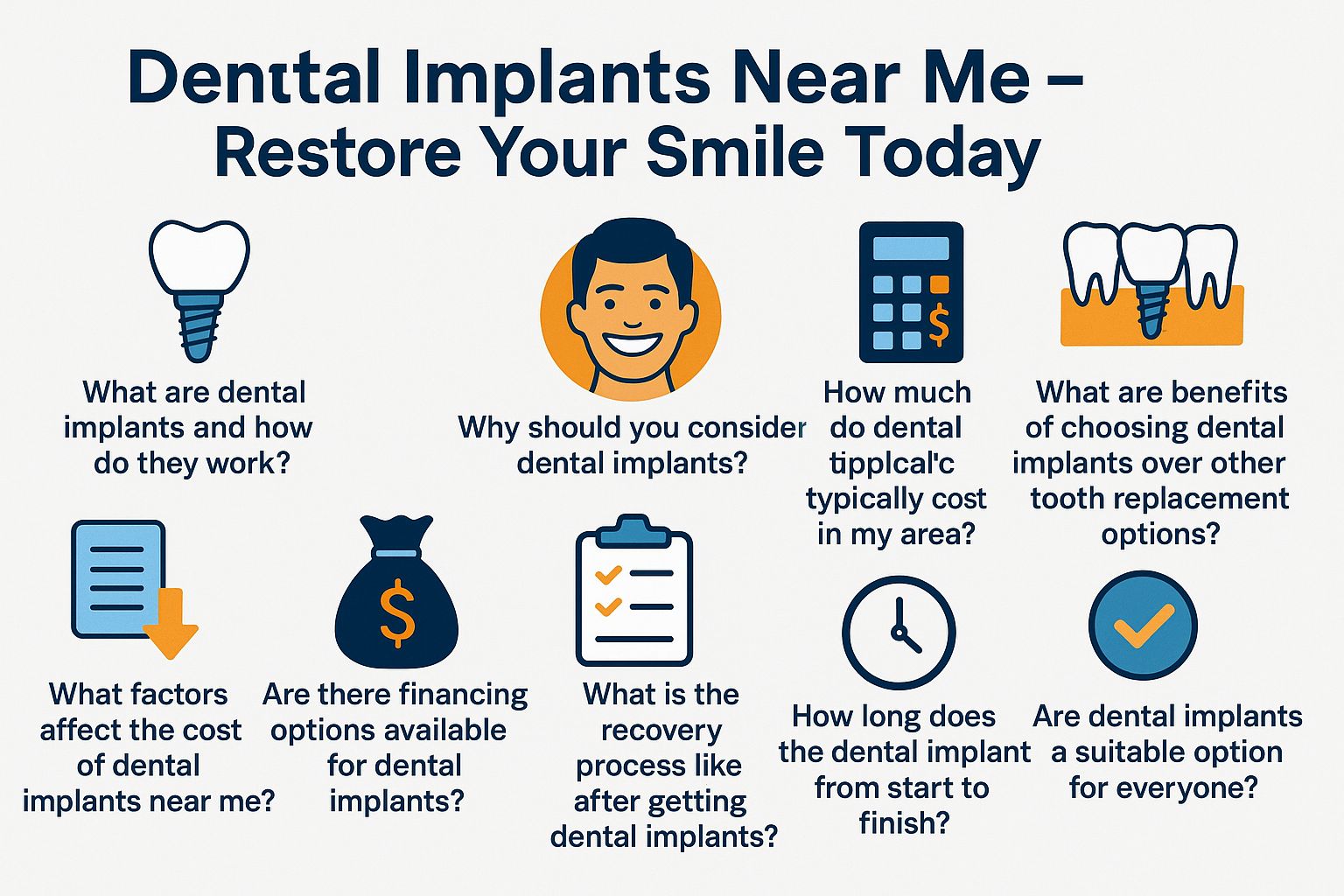Do dental visits make you anxious? Discover how dentists using nitrous oxide can make your appointments stress-free. Renowned experts, including Stanley Gordon West and Dr. Joseph Khalil, highlight the benefits of nitrous oxide and oral sedation for creating a more relaxed atmosphere during dental procedures, contributing to improved dental well-being.
This article explores sedation options that ease anxiety and improve your dental experience. We’ll also help you find qualified sedation professionals nearby who specialize in sedation techniques, ensuring you receive the care you need without the stress, ultimately promoting dental comfort.
Experts like Dr. Patrick Haddad and Dr. Brett Murphey stress the need for sedation expertise to create a calm environment.
What is nitrous oxide, and how does it work in dental procedures?
Nitrous oxide, known as laughing gas, is a sedative used in dental procedures. It helps patients relax and reduces anxiety, thereby enhancing the comfort of patients during their visits and aiding in dental anxiety management.
This colorless gas interacts with the nervous system by binding to opioid receptors. It reduces pain perception and creates a feeling of euphoria. Notably, the onset of its effects occurs within minutes, providing prompt relief during procedures.
Patients usually recover quickly, returning to normal activities shortly after treatment. This approach minimizes discomfort and improves dental experiences. This rapid action is particularly advantageous for effectively managing dental anxiety.
Why should you consider visiting dentists who use nitrous oxide for stress-free dental visits and sedation consultation?
Dentists who incorporate nitrous oxide into their practice foster a stress-free environment, significantly enhancing patient comfort during dental treatments and effectively reducing dental anxiety, supporting healthy smiles and dental comfort.
Research indicates about 70% of patients feel less anxious when using nitrous oxide. It calms them while letting them stay awake, contributing to a positive dental experience.
Practices like All Smiles Family Dentistry prioritize nitrous oxide to enhance patient comfort and experience.
Additionally, employing comforting techniques-such as guided imagery or calming music-can further help alleviate anxiety.
Patients should discuss concerns with their dentist before treatment. This helps tailor sedation strategies for a relaxing visit.
How does nitrous oxide help alleviate dental anxiety and fear?
Nitrous oxide effectively alleviates dental anxiety by inducing a state of euphoria and relaxation, thereby managing the fear commonly associated with dental procedures.
Patients often report experiencing a sense of calm and detachment, which allows them to undergo treatments such as fillings or extractions without the usual stress. This gas functions by influencing neurotransmitters, which in turn reduces perceptions of pain and discomfort.
Dentists typically administer nitrous oxide via a mask, allowing for easy adjustments to achieve the desired level of sedation, ensuring sedation safety. Additionally, its calming properties can help alleviate the gag reflex, facilitating smoother procedures and supporting dental phobia management.
As a result, patients feel more at ease, which leads to quicker recovery and better dental experiences.
What are the benefits of using nitrous oxide compared to other sedation methods?
Nitrous oxide presents distinct advantages over alternative sedation methods, including rapid onset, ease of administration, and minimal recovery time, making it a preferred option for various dental procedures and promoting stress reduction.
When comparing nitrous oxide to oral and IV sedation, consider these aspects:
| Sedation Method | Onset Time | Level of Sedation | Recovery Time | Suitable Procedures |
|---|---|---|---|---|
| Nitrous Oxide | 2-3 minutes | Minimal | Immediate | Routine cleanings, fillings |
| Oral Sedation | 30-60 minutes | Moderate | 1-2 hours | Extractions, some oral surgeries |
| IV Sedation | 1-3 minutes | Deep | A few hours | Major surgeries, extensive procedures |
A dental practice that uses nitrous oxide finds it effective for pediatric patients, as it facilitates rapid relaxation and prompt recovery, thereby contributing to a positive experience for all involved.
Finding Dentists Offering Nitrous Oxide Sedation
To find dentists who provide nitrous oxide sedation, use online resources, such as DOCS Education, and local directories that focus on sedation dentistry, ensuring access to sedation expertise.
Search Google Maps for “nitrous oxide sedation dentist near me” to discover local options.
It is essential to review patient testimonials and verify credentials through platforms such as Healthgrades or Zocdoc to ensure that the dentist possesses legitimate experience in sedation techniques and sedation practices. This comprehensive approach will enable you to select a qualified provider with confidence for a smile transformation.
What to Expect During a Nitrous Oxide Sedation Dental Visit
Patients can expect a comfortable environment during a dental visit with nitrous oxide sedation, with the sedation being administered prior to the commencement of the procedure.
Upon arrival, patients are required to complete any necessary paperwork and discuss their medical history, including dental habits and sedation candidates, with the dentist.
Once they are seated, nitrous oxide is delivered through a small mask, allowing patients to gradually experience a state of relaxation, often described as a light, floating sensation. The dental procedure typically begins shortly thereafter, with many patients reporting a significant reduction in anxiety and discomfort.
Following the treatment, the effects of the nitrous oxide dissipate rapidly, enabling patients to generally resume their daily activities without delay. One patient remarked, “I felt calm throughout the procedure and was surprised at how quickly I bounced back afterward.”
Are there any risks or side effects associated with nitrous oxide use in dentistry and sedation methods?
Nitrous oxide is generally safe, but patients should know the potential risks and side effects prior to undergoing sedation dentistry. Common side effects associated with nitrous oxide include nausea, dizziness, and headaches.
To mitigate these risks, dental teams closely monitor patients’ vital signs and adjust the sedation level as needed. For example, in one case, a patient experienced mild nausea during a procedure, prompting the dental team to reduce the concentration of nitrous oxide and administer oxygen.
Consequently, the patient felt more comfortable and completed the appointment without further complications. Maintaining open communication with the dental team can greatly enhance patient comfort and minimize the likelihood of adverse effects.
How much do dentists charge for nitrous oxide sedation during procedures and sedation benefits?
Costs for nitrous oxide sedation typically range from $50 to $150 per visit, depending on the procedure.
Several factors influence this pricing, including the geographic region, as urban practices often charge higher fees due to increased operational costs, as well as the complexity of the dental procedure involved.
For example, a routine cleaning may incur a cost of approximately $50, while more complex procedures, such as root canals, may approach $150.
Some dental practices offer discounts for multiple sessions or package deals. Practices such as Courthouse Art of Dentistry and High Forest Dental are known for their beneficial offers. Always confirm estimates with your dentist and ask about available payment plans, supporting sedation consultation.
What types of dental procedures commonly use nitrous oxide sedation?
Nitrous oxide sedation is widely utilized in various dental procedures, such as cleanings, fillings, and root canals, to enhance patient comfort.
Dental professionals, including Dr. Pruitt, underscore its effectiveness in reducing anxiety and discomfort.
During filling procedures, nitrous oxide enables patients to remain relaxed while retaining awareness of their surroundings.
The sedative properties of nitrous oxide can mitigate the stress often associated with root canals. The rapid onset and recovery associated with nitrous oxide make it a preferred option. Patients frequently return to their regular activities shortly after treatment.
Its favorable safety profile makes it suitable for a diverse range of patients, including children and individuals with special needs, enhancing dental fears management.
Can children benefit from nitrous oxide sedation during dental visits?
Nitrous oxide sedation is beneficial for children, as it offers a gentle method for managing anxiety during dental visits. Research conducted by Upper Valley Pediatric Dentistry indicates that nitrous oxide effectively alleviates fear while exhibiting minimal side effects, thereby ensuring its safety for pediatric patients.
Parents help their children feel more comfortable by discussing the upcoming dental care appointment in a positive manner. It is beneficial to use straightforward language to explain how nitrous oxide aids in promoting relaxation and comfort during the procedure.
Practicing relaxation techniques, such as deep breathing exercises, can prove effective. This collaborative approach not only informs the child but also provides a sense of support, further diminishing their anxiety.
How does nitrous oxide affect recovery time after dental treatments?
Nitrous oxide facilitates rapid recovery after dental treatments. Most patients resume normal activities within minutes of the procedure.
Research indicates that patients often recover faster compared to those administered traditional local anesthesia. For example, a study published in the Journal of Dental Research revealed that 90% of participants who received nitrous oxide were prepared to leave within 10 minutes of the procedure.
This minimal downtime renders nitrous oxide an appealing option for both patients and practitioners, thereby promoting increased efficiency and quicker turnover in dental practices.
What questions should you ask your dentist about nitrous oxide sedation before your appointment?
Before your appointment, ask specific questions to your dentist regarding nitrous oxide sedation to ensure that you are well-informed and comfortable with the procedure.
- Begin by inquiring about sedation risks, including any potential side effects that you should be aware of.
- It is also important to ask how the sedation will be administered, specifically whether you will receive a mask or a nasal cannula.
- Clarify what you can expect both during and after the procedure, such as the time it will take for the sedation to take effect and the typical duration of the recovery period.
- Additionally, encourage an open dialogue about your medical history, particularly any breathing issues or allergies, so that your dentist can customize the sedation approach and sedation levels to meet your specific needs.
How to prepare for a dental visit involving nitrous oxide sedation?
Preparing for a dental visit that involves nitrous oxide sedation requires adherence to specific steps to ensure a smooth experience and optimal comfort.
- Begin by discussing any medical conditions or medications with your dentist, as these factors may influence the sedation process and anxiety reduction methods.
- Dress comfortably and avoid heavy makeup or strong fragrances, as these can interfere with the procedure.
- A light meal should be consumed beforehand; however, it is important to refrain from eating anything for at least two hours prior to the appointment.
On the day of the visit, one can expect a calm atmosphere. The dental team will thoroughly explain the process and monitor the patient closely.
This preparation fosters trust and helps reduce anxiety, contributing to a more pleasant dental experience.
What are the differences between nitrous oxide and other sedation options available at dental practices?
It’s important to know the differences between nitrous oxide and other sedation options for dental care.
Nitrous oxide, or laughing gas, works quickly for short procedures like cleanings and fillings, contributing to smile enhancement and healing smiles.
Oral sedation requires taking pills about an hour before your appointment. It can work well for longer procedures but may leave you groggy afterward.
IV sedation provides the deepest sedation and is best for extensive dental work. It needs careful monitoring following DOCS Education standards. Patients are encouraged to discuss their levels of anxiety and medical history with their dentist to determine the most appropriate sedation option tailored to their individual needs.
How can you ensure that the dentist you choose is qualified to administer nitrous oxide?
To ensure the safe administration of nitrous oxide, it is essential to verify that your dentist is qualified to administer nitrous oxide for safety.
- Begin by consulting your state dental board’s website, where you can find information regarding the dentist’s credentials, including licenses and any disciplinary actions.
- Look for certifications from reputable organizations such as the American Dental Association (ADA) or the American Academy of Dental Sleep Medicine.
- Additionally, it is advisable to review patient feedback on sites like Healthgrades or Yelp to understand their experiences with sedation.
- Finally, consider scheduling a consultation to discuss your concerns and observe the dentist’s approach firsthand.
Frequently Asked Questions
1. What is nitrous oxide and how does it help during dental visits?
Nitrous oxide, also known as laughing gas, is a type of sedation that is used to help patients relax and feel more comfortable during dental procedures. It is inhaled through a mask and produces a calming, euphoric effect, making the dental experience less stressful and more enjoyable.
2. Where can I find dentists who use nitrous oxide near me?
Finding dentists who use nitrous oxide is simple. Search online or ask friends and family for recommendations. Many dental practices now offer this option to patients who experience anxiety or fear during dental visits.
3. Are all dentists trained and qualified to use nitrous oxide?
No, not all dentists are trained and qualified to use nitrous oxide. In order to use this form of sedation, dentists must complete specialized training and obtain a certification from the state dental board. Make sure to choose a dentist who is properly trained and certified to administer nitrous oxide.
4. Is nitrous oxide safe for everyone to use?
Nitrous oxide is safe for most patients but may not be suitable for everyone. Your dentist will review your medical history to decide if it’s right for you.
5. Is nitrous oxide the only option for stress-free dental visits?
No, nitrous oxide is not the only option for stress-free dental visits. Some dentists may offer other forms of sedation, such as oral sedatives or IV sedation. It is best to discuss your options with your dentist to determine which form of sedation is most suitable for your specific needs.
6. Will I be able to drive myself home after using nitrous oxide?
Most patients can drive themselves home after using nitrous oxide, as its effects wear off quickly. However, it is always recommended to have a friend or family member drive you home, especially if you are feeling particularly anxious or have a longer procedure.




